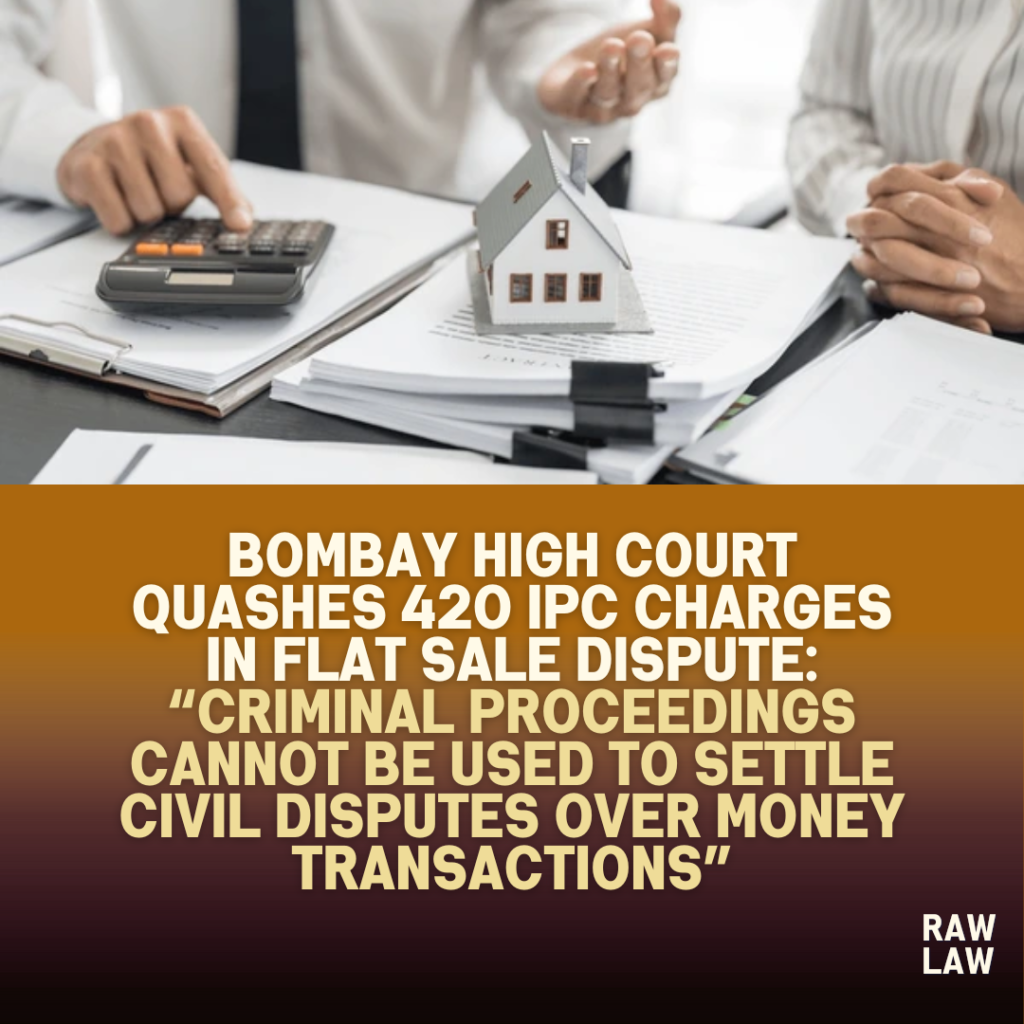Court’s Decision
In Nitin Laxmidas Dama v. State of Maharashtra, the Bombay High Court exercised its powers under Section 482 CrPC to quash FIRs registered under Sections 420, 406, and 34 of the Indian Penal Code (IPC) against the petitioner. The Court held that the dispute pertained to a civil transaction involving a flat purchase and did not disclose the essential ingredients of the alleged criminal offences. It ruled that continuation of the criminal proceedings would constitute an abuse of the process of law.
Facts
The case arose out of a transaction where the complainant allegedly paid ₹12.5 lakhs in cash to the petitioner towards the purchase of a flat in Dahisar, Mumbai. The complainant claimed that the petitioner had agreed to sell the flat and had initially accepted the money with the promise of execution of a sale deed. However, the petitioner later sold the flat to a third party and did not return the money to the complainant, thereby leading to the registration of an FIR for cheating and criminal breach of trust.
The petitioner contended that the entire transaction was based on mutual understanding and there was no written agreement or formal documentation executed between the parties. Moreover, the amount claimed was unaccounted cash, and the complainant had initiated criminal proceedings purely to exert pressure in a civil dispute.
Issues
- Whether the ingredients of Sections 420 (cheating), 406 (criminal breach of trust), and 34 (common intention) IPC are satisfied on the basis of the allegations made in the FIR?
- Whether a civil dispute involving monetary transactions can be converted into a criminal case by making vague allegations of cheating?
- Whether the High Court should exercise its powers under Section 482 CrPC to prevent abuse of the process of law?
Petitioner’s Arguments
The petitioner argued:
- The transaction was entirely civil in nature involving an alleged advance payment without any written agreement.
- The complainant had failed to initiate any civil suit for recovery, indicating that the claim was not bona fide.
- There was no dishonest intention from the inception of the transaction; hence, the essential ingredients of cheating were absent.
- The criminal complaint was an afterthought, filed only to coerce the petitioner into paying money in the absence of any enforceable contract.
Respondent’s Arguments
The State opposed the quashing and contended:
- The FIR disclosed sufficient material to initiate investigation for offences under Sections 420 and 406 IPC.
- The complainant had been induced to part with ₹12.5 lakhs based on the promise of sale.
- The subsequent act of selling the flat to a third party and not refunding the amount clearly indicated dishonest intention.
- Investigation was at a nascent stage and should not be curtailed prematurely.
Analysis of the Law
The Court examined the legal ingredients required for the offences alleged:
- Section 420 IPC (Cheating) requires:
- Deception of a person.
- Fraudulently or dishonestly inducing that person to deliver property.
- The fraudulent intention must exist at the inception of the transaction.
- Section 406 IPC (Criminal Breach of Trust) requires:
- Entrustment of property.
- Dishonest misappropriation or conversion by the person entrusted.
The Court noted that mere failure to return money in a contractual setting does not attract Section 420 unless fraudulent intent is shown at the outset. The transaction did not involve entrustment either, as the complainant voluntarily gave the money.
Precedent Analysis
The Court relied on the following authorities:
- Vesa Holdings (P) Ltd. v. State of Kerala, (2015) 8 SCC 293
➤ Civil disputes cannot be given criminal colour unless clear criminal intent is shown. - G. Sagar Suri v. State of U.P., (2000) 2 SCC 636
➤ Held that criminal proceedings should not be used to settle civil disputes. - Indian Oil Corporation v. NEPC India Ltd., (2006) 6 SCC 736
➤ Emphasized that conversion of a civil matter into criminal proceedings is not permissible.
The Court concluded that none of the judgments permitted continuation of proceedings in such purely civil matters.
Court’s Reasoning
Justice S.V. Kotwal observed:
“There is no allegation of fraudulent inducement at the inception. The FIR appears to be an attempt to convert a money recovery dispute into a criminal case.”
The Court emphasized that criminal law cannot be used as a tool for recovering amounts in cash transactions, particularly when there is no formal documentation or evidence of entrustment or fraudulent promise.
Conclusion
- The FIR registered against the petitioner under Sections 420, 406, and 34 IPC was quashed.
- The Court held that the dispute was civil in nature and continuation of criminal proceedings would be a misuse of process.
Implications
This decision:
- Reinforces that criminal law cannot be invoked to resolve civil money disputes.
- Offers protection to individuals facing coercive FIRs filed to pressurize settlement in civil claims.
- Encourages recourse to civil remedies like recovery suits rather than resorting to criminal litigation in purely commercial or contractual disputes.
Summary of Cases Referred
- Vesa Holdings v. State of Kerala, (2015) 8 SCC 293: Civil breach of contract does not amount to cheating unless fraudulent intent is proved.
- G. Sagar Suri v. State of U.P., (2000) 2 SCC 636: Criminal proceedings should not be used to settle monetary civil disputes.
- Indian Oil Corp. v. NEPC India Ltd., (2006) 6 SCC 736: Civil transactions must not be given criminal dimensions unless statutory elements are satisfied.
